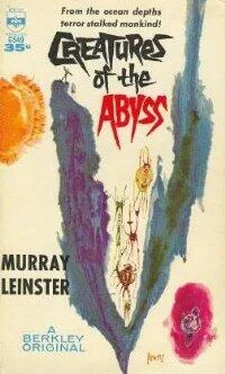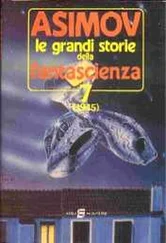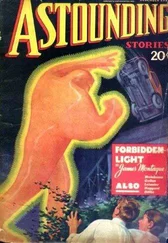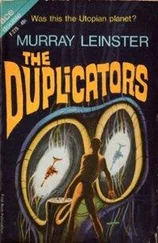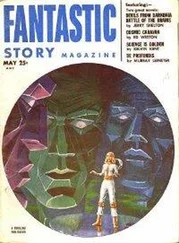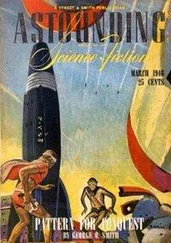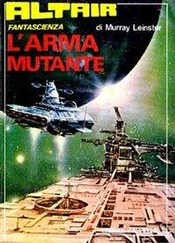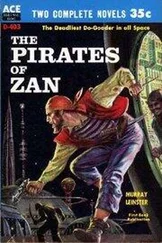At exactly fourteen minutes after eight—a time way ahead of the official schedule but exactly as Dr. Morton had predicted—the bolide passed overhead. It was an amazing spectacle. It left a trail of flame behind, across thirty degrees of sky. It went on and on…
Less than ten minutes later the short-wave radio informed the island that the shooting star had been seen to fall in the sea. It had been observed by a plane which was then circling over the area in which the Esperance had encountered the circle of shining sea. The plane was there to see if the phenomenon would occur again. It didn’t.
But the plane saw the bolide as it struck the sea, and huge masses of steam and spray arose. The bolide was not white-hot, then, as when it passed over Thrawn Island. It was barely of dull-red brightness. It hit the sea and sank, leaving steam behind.
The water was forty-five hundred fathoms deep at that point.
Fourteen hours later the Esperance made ready to sail from Thrawn Island. Her purpose was to carry the plastic objects to Manila, where they would be turned over to specialized laboratories to be studied. Five such objects had been found before: one in the Thrawn Island lagoon, while the satellite-tracking station was under construction, and four attached to exotic fish brought to market by the commercial fishing boat La Rubia. Now there were eight more, of four different kinds. To the laboratories would go Terry’s observation that one kind of these objects absorbed sound at audible frequencies and retransmitted it at much higher ones, but only under water. All this was very interesting and very puzzling.
But a serious disturbance had arisen at the tracking station.
Dr. Morton came to the Esperance before her departure. He had a problem. He’d predicted to the minute, and almost to the mile, the landing of the bolide of the night before. That was the first accurate prediction of the kind in history. But his forecast stood alone in its precision. Nobody else had even come near being right. Now he was being insistently queried by astronomers the world over. They wanted to know how he’d done it. In particular, they wanted to know how he’d figured that the bolide would lose just so many feet per second velocity, neither more nor less, in a three-quarter orbit around the world. Nobody else had such a figure in his equation for the landing spot. Dr. Morton had. His prediction had been exact. Where did he get that necessary but inexplicable figure?
He beckoned Davis and Terry to go below with him, in the Esperance’s after cabin. Terry hesitated.
“You may as well hear my troubles,” said Morton vexedly. “You’re largely responsible for them.”
Terry followed uneasily. He didn’t see how Dr. Morton could hold them responsible. He had guarded his own guesses about the Esperance’s discoveries against even the slightest expression. He couldn’t let himself believe in their correctness, but he was appalled at the inadequacy of all other explanations of past events.
“In sateen months,” said Morton annoyedly, down below, “we’ve spotted six bolides coming in to land in the Luzon Deep. That’s out of all reason! Of course, it could be a mathematical series of wildly unlikely coincidences, such as probability says may happen sometimes. Up to last night that seemed to be a possible explanation.”
Davis nodded. His expression was odd.
“But now,” said Morton somehow indignantly, “that’s ruled out! It’s ruled out by last night’s bolide, and yesterday’s fishing experiment, and that business of the shining sea, plus those damned plastic gadgets and deep sea fish thriving in shallow water! There’s no reasonable explanation for such things, and they’re not mere coincidences!”
“I’m afraid,” admitted Davis, “that they’re not.”
“The obvious explanation,” said Morton doggedly, “I refuse to name or consider. But nevertheless the question is not whether a theory or an explanation is unlikely or not. The question is whether it’s true!”
Davis nodded. Terry had to agree. But the way people are trained in modern times puts a great emphasis on reason, often at the expense of fact. Terry felt the customary civilized reluctance to accept a statistically improbable idea.
“I’m on a spot,” fumed Morton. “I calculated that the damned bolide would slow after it went into orbit around the earth. I calculated that it would slow exactly so much. Do you want to know how I figured how much it should slow down? I’ll tell you! I calculated exactly how much it would have to slow to be able to fall into the Luzon Deep! It did slow. It did fall there. But how am I going to explain that to Washington?”
Terry suddenly felt a warm sympathy for Morton. It is bad enough to dispute with oneself when something incredible happens. But Dr. Morton had gone out on a limb. He’d been caught psychologically naked telling the truth, and now he was asked to explain it. And he couldn’t.
“This thing has got to come to a head!” he said angrily. “Sooner or later they’ll find out that I don’t calculate where it’ll land by its behavior in space but by its landing spot! Davis, you’ve talked about stirring something up. For Heaven’s sake, do it! You may save my reputation! And you…”
“I’ll try to think of something,” said Davis reservedly.
“I’ve got to have proof that my suspicions are right or wrong before I’m ruined. I know what you’re planning to do. Do it! Is there anything that can be done here to help?”
Davis spread out his hands helplessly. But Terry said, “Yes. Send a boat every so often to listen at the gap to the reef. Put an oar overboard and put your ear to the handle. You should hear the underwater hum, if it’s still there. It was there this morning.”
Morton looked at him suspiciously.
“Why check on it? Should it change?”
“Perhaps,” said Terry. “We’ve speared most of the deep-sea fish to the lagoon. Maybe we’ve interfered with… the reports from the plastic objects, telling what was happening up here. There may be a reaction. If so, most likely the humming will stop, and after a longer or shorter time begin again. And then, if my guess is right, there’ll be more deep-sea creatures in the lagoon.”
“Ha,” said Morton. “I think you and I have the same kind of delusions! All right. I’ll see that that’s done. You two do the rest.”
He went abovedecks. When Terry got on deck, Dr. Morton’s angular figure was already marching along the wharf to the shore.
There was no ceremony of departure. The Esperance cast off and her engine started. She moved toward the lagoon entrance under power only, but her sails were hoisted as she floated on, and Jug Bell was trimming the jib when she cleared the opening to the sea.
The humming in the water was still audible to the submarine ear, close to the land. It occurred to Terry to take a bearing on the source of the sound, noting both the compass direction and the vertical angle from the reef. If his vertical-angle reading was accurate, a line from the reef to the source of the sound would touch the bottom at twenty-seven thousand feet down, between four and five miles away.
The Esperance sailed on. The humming duly faded away. Terry left the recorder picking up undersea sounds, without recording them. It relayed the underwater sounds to the people on deck. It was in Terry’s mind to keep at least half an ear cocked to it, in case the mooing sounds, heard and recorded elsewhere, should come again.
They did not. The Esperance went methodically on her way, headed south by east, under sail. A slowly swaying horizon of unbroken sea was all about. There was nothing in the least unusual or mysterious to be seen anywhere.
Читать дальше
